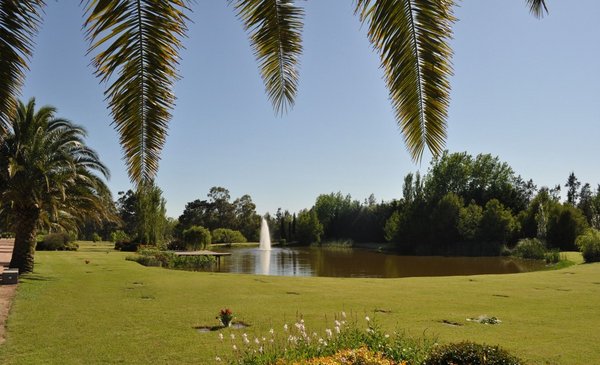A new ordinance project of the Municipality of Canelones intends to extend its control over private cemeteries in the department by creating a concession regime that implies that public calls for service management have to be made every 30 years. This provoked criticism from the companies involved, who understand that a problem can be unleashed because it is private land.
Those responsible for memory park They went to the Departmental Board on Monday with an analysis that labels the article as “legal excess”while since Martinelli Park they were to break down their “concerns”.
The project that came to the Board weeks ago has already unleashed Conversations between the businessmen with the mayor Yamandú Orsias he learned The Observer. The intention of the Broad Front in Canelones is to expedite the discussion before the recess of the organism, with the possibility of dealing with it in the session on January 10, said the astorista mayor Roberto Saravia, president of the Legislation Commission.
The central questions of the companies –which between the two are owners of 46 hectares distributed in three gardens on the metropolitan area– point against the unconstitutionalities of the articles and the increase in the percentage (from 3% to 6%) that the commune receives on the prices charged by the necropolis.
The landscaped cemeteries regime came into effect in 1992 during the administration of white Sebastián Andújar, and now the Orsi administration defends the proposed changes as a updating of the regulations.
The critics
“Cemeteries do not become extinct or disappear for the mere fact that a term expires”begins the memorandum delivered by Parque del Recuerdo to the councilors, and to which he agreed The Observer. The company –which has two gardens, one of 14 hectares on Route 5, and another of nine on the Interbalnearia– defended that the necropolis “operate in perpetuity, without a term that limits its operation since it is unthinkable that the access of different generations is closed to pay homage” to their own.
“If the ordinance is approved as projected, in the case of Parque del Recuerdo, It would generate instability for more than 7,000 families that today have their loved ones buried”they detailed, alleging that “it would constitute unjustified discrimination if private cemeteries with gardens were given a more unfavorable treatment for the mere fact of not belonging to a religious congregation or a community linked to a foreign country, or not belonging to the State”.
In this sense, they considered that the Constitution is “violated” in the rights to equality and freedom to work. From Parque del Recuerdo they pointed out that “the usual practice” of the Canary Islands commune since 1992 is to sign contracts for the assignment of rights over the plots “in perpetuity” and they understand that the municipal qualification “does not have to be” different from those that the State gives to the mutualists, without setting a “term” and limiting itself “to controlling their normal and lawful operation.”
One of the axes is that, according to Parque del Recuerdo, it is a mistake for the commune to define its link with parked cemeteries as a “concession”, when they are “in privately owned real estate and do not use public domain property”. The company insisted that the said necropolis “have been an excellent source of resources for the municipal treasury.”
Meanwhile, the ordinance under study makes no mention of the private property of the Martinelli gardens, Parque del Recuerdo and Fresnos de Carrasco, so according to the company, the door is opened for the commune to “unilaterally terminate” the concessions at 30 years, being able to remain “all the improvements” of the ex-concessionaire “in the hands of the administration”. The regulations establish that in this scenario the company would not have “the right to any claim”.
“This legal excess in no way can be applied to the case of cemeteries since the ownership of the land belongs to the companies,” they indicated.. “For this there should be a expropriation procedure paying fair and prior compensation for the damages suffered by those affected”, they added.
If a concession falls, the commune could call a tender to continue providing funeral services, which in the company’s understanding cannot happen on private property. This “undermines constitutional rights such as private property and free enterprise”, They say in Parque del Remembrance.
María and Ángel Martinelli, directors of the Martinelli Park, They spoke before the Board of the increase from 3% to 6% of the contribution that the commune receives for the price charged by the owner. The company spoke that this increase would have to finally be transferred to prices, which today exceed US$ 2,500 per plot, according to the mayor Saravia.
Martinelli’s legal advisor, Horacio Fernández, limited himself to telling The Observer They were left to further study the provisions. “There are things that are ordered and modernized, but we also have some concerns,” he said.
“It’s a public service”
The director of Administration of the Intendancy, Pedro Irigoin, justified that the cemeteries are “a public service” and therefore their responsibility to execute public calls. “I have to regulate an activity that was not fully lauded”said to The Observer.
“On the one hand there is the legislative procedure (in the Board) and on the other the bidding process. We cannot correct (what they propose) in de facto concession legislation since the ’90s. We are more than satisfied with the service they provide, but we have We have to comply with the call, and in the specifications we are going to rectify what they ask for. We must leave the door open so that if in 15 years they give a bad service or are merged, there may be new concessions, as well as for companies to be installed elsewhere,” explained Irigoin.
Regarding the increase in prices, the head of the MPP said that “a lot of time has passed and we must update” the values, while adding that the commune “works better and better with mortuary police, registries and its own infrastructures.”







